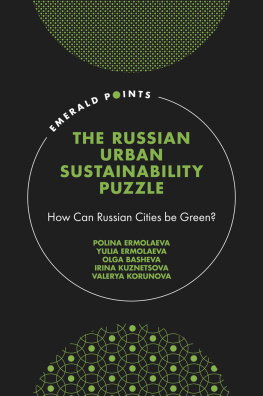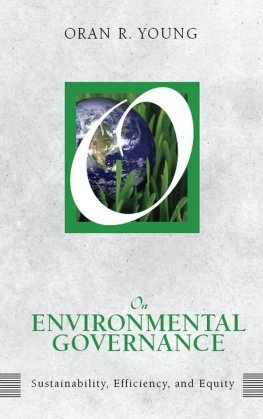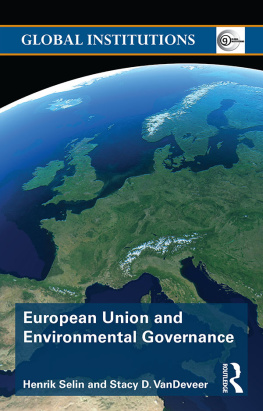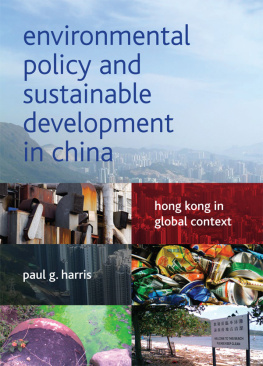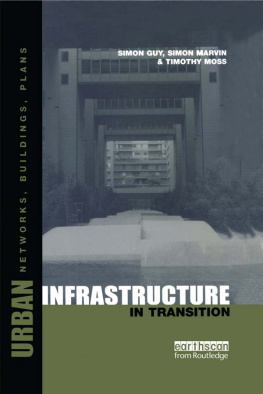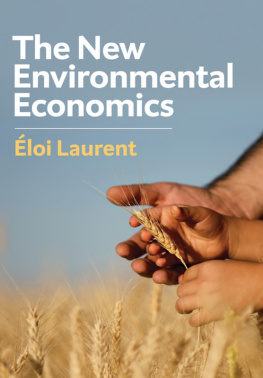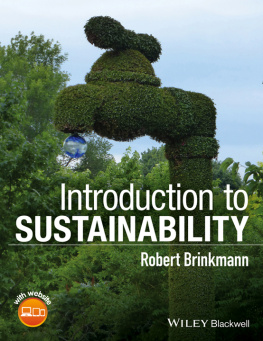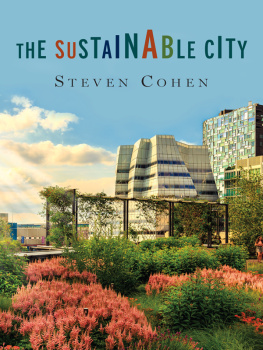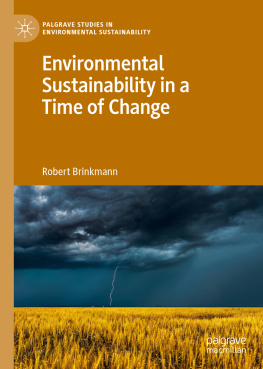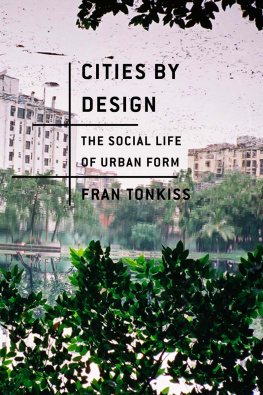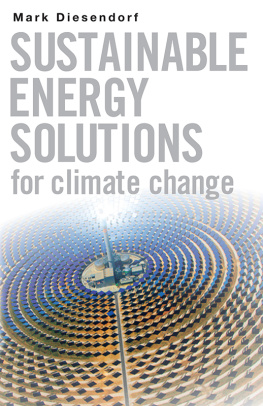THE RUSSIAN URBAN SUSTAINABILITY PUZZLE
How Can Russian Cities Be Green?
POLINA ERMOLAEVA
Kazan Federal University, Russia
YULIA ERMOLAEVA
Federal Research Center for Sociology Russian Academy of Sciences, Russia
OLGA BASHEVA
Federal Research Center for Sociology Russian Academy of Sciences, Russia
IRINA KUZNETSOVA
University of Birmingham, UK
VALERYA KORUNOVA
Center of Advanced Economic Research at the Academy of Sciences of the Republic of Tatarstan, Russia
United Kingdom North America Japan India
Malaysia China
Emerald Publishing Limited
Howard House, Wagon Lane, Bingley BD16 1WA, UK
First edition 2021
Copyright 2021 Polina Ermolaeva, Yulia Ermolaeva, Olga Basheva, Irina Kuznetsova and Valerya Korunova. Published under exclusive licence by Emerald Publishing.
Reprints and permissions service
Contact: permissions@emeraldinsight.com
No part of this book may be reproduced, stored in a retrieval system, transmitted in any form or by any means electronic, mechanical, photocopying, recording or otherwise without either the prior written permission of the publisher or a licence permitting restricted copying issued in the UK by The Copyright Licensing Agency and in the USA by The Copyright Clearance Center. Any opinions expressed in the chapters are those of the authors. Whilst Emerald makes every effort to ensure the quality and accuracy of its content, Emerald makes no representation implied or otherwise, as to the chapters' suitability and application and disclaims any warranties, express or implied, to their use.
British Library Cataloguing in Publication Data
A catalogue record for this book is available from the British Library
ISBN: 978-1-83982-631-3 (Print)
ISBN: 978-1-83982-630-6 (Online)
ISBN: 978-1-83982-632-0 (Epub)
CONTENTS
P. Ermolaeva
P. Ermolaeva, V. Korunova, O. Basheva and Y. Ermolaeva
I. Kuznetsova and V. Korunova
P. Ermolaeva
Y. Ermolaeva
Y. Ermolaeva and P. Ermolaeva
O. Basheva and I. Kuznetsova
O. Basheva, V. Korunova and I. Kuznetsova
P. Ermolaeva, Y. Ermolaeva, O. Basheva, I. Kuznetsova and V. Korunova
LIST OF FIGURES
| Figure 2.1. | Practices of Citizens to Minimize the Negative Impact of Air Pollution (%). |
| Figure 2.2. | Practices of Citizens to Clean the Tap Water (%). |
| Figure 3.1. | Citizens' Assessments of Different Features of the Transport System in Russian Megacities (Average Points, Where 5 Excellent, 3 Moderate, and 1 Not Satisfactory). |
| Figure 3.2. | The Main Reasons for Not Using a Bike/Scooter (%). |
| Figure 4.1. | Energy-saving Practices (%). |
| Figure 4.2. | Water-saving Practices (%). |
| Figure 5.1. | Experts' Scheme of Zero-waste Management in Russia. |
| Figure 5.2. | Household Waste Management Practices (%). |
| Figure 6.1. | Do You Walk in Parks/Squares and Outdoor Recreation Areas in Your City? (%). |
| Figure 7.1. | In Your Opinion, Are Local Authorities Actively Involving the Population in Environmental Decision-making? (%). |
| Figure 7.2. | The Most Urgent Environmental Conflicts Stated by the Population (%). |
ABOUT THE CONTRIBUTORS
Dr Olga Basheva is Research Fellow at Kazan Federal University and the Federal Center of Theoretical and Applied Sociology of the Russian Academy of Sciences. Research interests include: environmental sociology, socio-ecological rehabilitation processes, collective actions, networks of nongovernmental organizations and social movements, social capital, volunteering, media research, social networks, and media. Since 2007, she has participated in more than 10 Russian research projects. In 2019, Olga became the head of the research project Emergency volunteering as a reply to the natural and technological challenges in Russia.
Dr Polina Ermolaeva is Associate Professor at the Department of Sociology of Kazan Federal University, Research Fellow at the Federal Center of Theoretical and Applied Sociology of the Russian Academy of Sciences and the Center of Advanced Economic Research. Her research interests center on sustainability transitions, climate research, environmental governance, sustainable cities, and volunteering in emergency. Polina led over 50 global projects for such organizations as UBER, the World Bank Foundation, Open Society Foundation, British Petroleum, Fulbright, IREX, Russian Scientific Foundation, and others.
Yulia Ermolaeva is Research Fellow at Kazan Federal University and the Federal Center of Theoretical and Applied Sociology of the Russian Academy of Sciences, Secretary and Organizer of events at the Russian Society of Sociologists. Her area of professional interests include the interdisciplinary studies in the field of environmental sociology, sociology of professions, waste management, renewable energy sources, sustainable production and consumption, and ecoactivism. Yulia took part in more than 10 research projects on the study of engineering professions and dynasties, the problems of green cities, waste management, the critical state of natural and social systems, and ecoactivism.
Valerya Korunova is Research Fellow at Kazan Federal University and the Center of Advanced Economic Research at the Academy of Sciences of the Republic of Tatarstan. Research interests include the analysis of environmental awareness and ecological culture of youth, ecological communication, the content and features of the (re)translation of ecological information in mass media, urban environmental risks, and their awareness of the citizens.
Dr Irina Kuznetsova is Research Fellow and Lecturer at the School of Geography, Earth and Environmental Sciences of the University of Birmingham, UK. Her recent projects focused on population displacement from Ukraine and funded by AHRC, British Academy, and Wellcome trust. She is also a coinvestigator in Horizon 2020 project on the impact of migration on rural communities. Irina works also on migration from Central Asia in Russia. Recently, she started studies on mental health and forced displacement in Nigeria, Brazil, and Japan.
LIST OF CONTRIBUTORS
| Olga Basheva | Federal Research Center for Sociology Russian Academy of Sciences, Russia |
| Polina Ermolaeva | Kazan Federal University, Russia |
| Yulia Ermolaeva | Federal Research Center for Sociology Russian Academy of Sciences, Russia |
| Valerya Korunova | Center of Advanced Economic Research at the Academy of Sciences of the Republic of Tatarstan, Russia |
| Irina Kuznetsova | University of Birmingham, UK |
ACKNOWLEDGMENTS
This work was supported by the Russian Science Foundation under grant number: 17-78-20106 Russian cites in the context of new social and environmental challenges: building complex interdisciplinary model of an assessment of green cities and strategies for their development in Russia.

